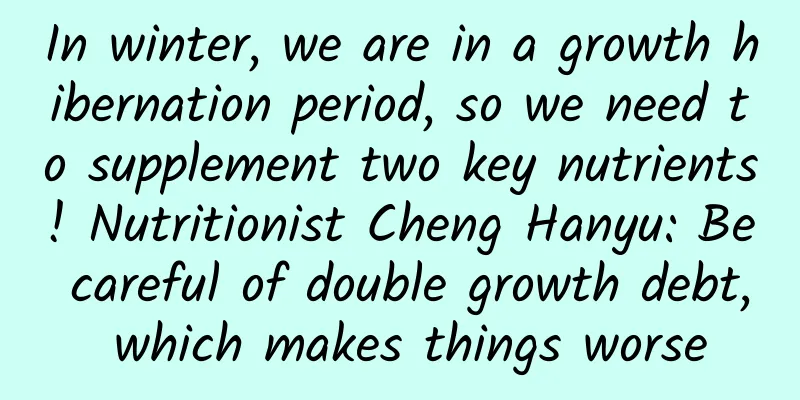In winter, we are in a growth hibernation period, so we need to supplement two key nutrients! Nutritionist Cheng Hanyu: Be careful of double growth debt, which makes things worse

|
The winter is cold and wet and affected by the epidemic. Children do not have enough outdoor activities and exercise. In addition, the sunlight is reduced and the children’s exposure to sunlight is shortened. These two major reasons will cause children to have double growth debt and enter a "growth hibernation period"! Nutritionists say that children's growth requires two key nutrients, including calcium and vitamin D. How should they be taken correctly? What is the "growth hibernation period" of children?The double growth debt accumulated by incorrect winter living habits and a sudden drop in activity due to the epidemic is not conducive to children's precious growth period. Foreign studies have confirmed that due to less sunlight and reduced exercise in winter, children's growth has a seasonal pattern of "faster in spring and summer, slower in autumn and winter." The latest report points out that children's activity level has dropped by 20% during the epidemic. The lack of sunlight to help the body synthesize vitamin D has affected the calcium absorption rate, making this year's "growth hibernation period" even worse. What is the double growth debt of children?According to an online survey of 300 parents of elementary school children, children are particularly likely to develop habits that are not conducive to their growth in the winter, such as staying at home, getting less sun exposure, and having less activity. Nutritionist Cheng Hanyu explained that the impact of these seemingly minor daily routines on children is something that parents may overlook, and pointed out the double growth liabilities that should be paid special attention to this winter: Growth Debt 1: Lack of Exercise and Sun Exposure in WinterFor children in their growth period, sufficient exercise is an essential element to stimulate the secretion of growth hormone. At the same time, repeated muscle contraction during exercise will also put pressure on the bones, thereby driving the differentiation of growth plate cells and promoting the growth of the muscle and skeletal system. The US Centers for Disease Control and Prevention (CDC) also recommends that children and adolescents aged 6 to 17 need to exercise for 60 minutes a day. But looking at the campus in winter, the playground is particularly deserted in the cold weather. When children huddle in the classroom, not only their physical activity is affected, but they also lack vitamin D brought by sunlight, which in turn affects the body's absorption of calcium. Growth Debt 2: Activity volume has been cut for three consecutive years due to the epidemicA foreign study surveyed more than 14,000 children and adolescents aged 3 to 18 and found that the activity level of children and adolescents decreased by 20% during the epidemic, and the amount of high-intensity activity decreased by an average of 17 minutes per day. The unfavorable factors for growth in winter have made the situation even worse, causing the precious growth period to go through three years of cold winter. Nutritionist Cheng Hanyu said that children's growth requires two key nutrients, including calcium and vitamin D. (Photo provided by nutritionist Cheng Hanyu) How to avoid the harm caused by growth hibernation?Faced with children’s growth gaps, what nutrients do they need to supplement to avoid the harm caused by growth hibernation? Nutritionist Cheng Hanyu said that children's growth requires two key nutrients, including calcium and vitamin D. Many parents know that fresh milk is a source of calcium, which is necessary for children's growth, but they mistakenly believe that "plant milk" such as soy milk and oat milk can also be used as substitutes. Special reminder: although plant milk also contains protein, it cannot replace the calcium, vitamin D and other essential nutrients for growth in fresh milk. Calcium supplementation Therefore, parents are advised to pay close attention to their children's fresh milk intake in the winter due to the epidemic, and follow the recommendations of the National Health Administration. The daily calcium intake is 800 mg for children aged 7-9, 1000 mg for children aged 10-12, and 1200 mg for children aged 13-18. Children should drink two servings (240 ml per serving) of fresh milk every day to supplement the daily calcium needs. Vitamin D supplementation Take into account the amount of exercise and sun exposure to keep your children away from growth crises. Maintain outdoor exercise and sun exposure to allow sunlight to synthesize vitamin D. However, if this is not possible, it is recommended to supplement vitamin D through the following foods, including: deep-sea fish, shiitake mushrooms, mushrooms, eggs, etc., all of which contain vitamin D. Nutritionist Cheng Hanyu Facebook |
Recommend
Can cervicitis cause back pain?
It is uncertain whether cervicitis will cause bac...
Some common symptoms of menopause
Generally speaking, women will only experience me...
How much does it cost to treat uterine fibroids? Common symptoms of uterine fibroids
First of all, you should know that there are many...
Are fruits and whole grains good for your health? Should we eat more of them? Slimming Queen: The Devil is Hiding Here…
People who are trying to lose weight may often he...
What is the best way to treat cervical erosion? These methods are the most effective in treating cervical erosion.
Cervical erosion is well known to most women and ...
Experts answer nursing knowledge about primary dysmenorrhea
For patients with primary dysmenorrhea, in additi...
What is the difference between pelvic inflammatory disease and gynecological inflammation?
The main difference between pelvic inflammatory d...
What medicine is good for pelvic peritonitis
Pelvic inflammatory disease is a gynecological di...
What are the causes of ectopic pregnancy?
In recent years, the incidence of ectopic pregnan...
Clinical diagnosis of cervical condyloma infection
Nowadays, people's sexual concepts are becomi...
Does the right ovarian cyst hurt? What are the harms to the human body?
Does a right ovarian cyst hurt? What harm does it...
What should women eat after uterine fibroid surgery? What foods should women with uterine fibroids not eat?
To prevent uterine fibroids, we must start from t...
The most important preventive measures for vaginitis
Vaginitis is very common in life. After suffering...
Pay attention to cervical precancerous lesions
Cervical precancerous lesions refer to the lesion...
Women who have menstrual changes are worried about perimenopausal syndrome
Perimenopausal syndrome, also known as menopausal...









